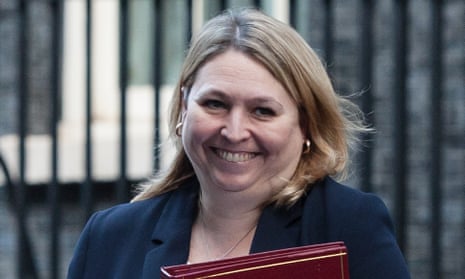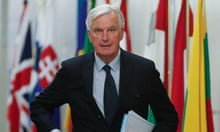Karen Bradley, the secretary of state for Northern Ireland, has given assurances that the British government will not renege on the “backstop” commitment over the Irish border issue in Brexit negotiations.
She said the government was fully committed to the agreement it had struck with the EU last December when Theresa May and the European commission president, Jean Claude Juncker, signed the “joint report” ending the first phase of Brexit negotiations covering EU citizens, the divorce bill and the Irish border.
“We are committed to everything we have agreed to in the joint report and we will ensure there is no border on the island of Ireland,” she told the British-Irish Parliamentary Assembly in London on Monday.
At the weekend the Brexit secretary, Dominic Raab, suggested the EU and Britain would need to choose between extending the Brexit transition period and a time-limited backstop to avoid a hard border in Ireland.
Quick GuideBrexit and backstops: an explainer
Show
A backstop is required to ensure there is no hard border in Ireland if a comprehensive free trade deal cannot be signed before the end of 2020. Theresa May has proposed to the EU that the whole of the UK would remain in the customs union after Brexit, but Brussels has said it needs more time to evaluate the proposal.
As a result, the EU insists on having its own backstop - the backstop to the backstop - which would mean Northern Ireland would remain in the single market and customs union in the absence of a free trade deal, prompting fierce objections from Conservative hard Brexiters and the DUP, which props up her government.
That prompted May to propose a country-wide alternative in which the whole of the UK would remain in parts of the customs union after Brexit.
“The EU still requires a ‘backstop to the backstop’ – effectively an insurance policy for the insurance policy. And they want this to be the Northern Ireland-only solution that they had previously proposed,” May told MPs.
Raising the stakes, the prime minister said the EU’s insistence amounted to a threat to the constitution of the UK: “We have been clear that we cannot agree to anything that threatens the integrity of our United Kingdom,” she added.
Bradley was told by a series of Irish politicians present at the meeting that people in Ireland were becoming increasingly anxious about Brexit and suggestions over the weekend that the December joint report was irrelevant.
“I am very, very concerned at the mood in the last few days,” said Frank Feighan, of the ruling Fine Gael party. “Could the UK ever be trusted again if it were to renege on a written deal?”
Ireland’s ambassador to the UK, Adrian O’Neill, said the prospect of a hard Brexit was causing “genuine anxiety” in Northern Ireland and Irish border counties.
He said time-limiting the backstop would make it redundant. “Neither in December or March texts are there references to time-limited backstops. Since the backstop is designed to operate in all circumstances, the proscribed time limit would rather defeat the stated purpose.”
There have been suggestions from Brexiters that the Irish backstop has been exaggerated or weaponised by the EU in negotiations.
Last week the former Tory leader Iain Duncan Smith described the impasse over the backstop as “absurd” and urged the prime minister to tell the EU “to stop putting up ridiculous problems like the backstop” to prevent a deal being done.
Helen McEntee, Ireland’s minister for European affairs, told the Irish Times that if London reneged on the backstop then agreements already reached on citizens’ rights and the so-called divorce bill could be reopened.
“I don’t think in terms of the negotiation that you can go back and undo something that has been agreed on both sides and sets a new red line on something that has been already agreed in negotiations. I don’t think anyone can or should be able to do that,” she said.










